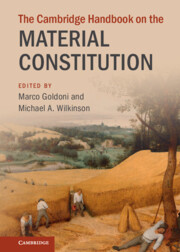Book contents
- The Cambridge Handbook on the Material Constitution
- The Cambridge Handbook on the Material Constitution
- Copyright page
- Contents
- Contributors
- Introduction
- Part I History
- Part II Challenges
- 11 The Material Constitution and Imperialism
- 12 The Material Constitution of Federations
- 13 The Materialist Turn in Constitutional Thought
- 14 Three Registers of the Material Constitution
- 15 What Matter(s)? A Processual View of the Material Constitution
- 16 The Material Constitution and the Rule of Recognition
- 17 Constitutional Matter and Form
- Part III Analyses
- Index
17 - Constitutional Matter and Form
An Exploration of Constitutional Language
from Part II - Challenges
Published online by Cambridge University Press: 15 January 2023
- The Cambridge Handbook on the Material Constitution
- The Cambridge Handbook on the Material Constitution
- Copyright page
- Contents
- Contributors
- Introduction
- Part I History
- Part II Challenges
- 11 The Material Constitution and Imperialism
- 12 The Material Constitution of Federations
- 13 The Materialist Turn in Constitutional Thought
- 14 Three Registers of the Material Constitution
- 15 What Matter(s)? A Processual View of the Material Constitution
- 16 The Material Constitution and the Rule of Recognition
- 17 Constitutional Matter and Form
- Part III Analyses
- Index
Summary
The idea of a material constitution has become influential for at least two reasons. The first reason is the absence of coincidence between the scope of the rules of the formal or written constitution and the wider field of constitutional rules. Second, the idea of a material constitution also comes into play as some authors will define the constitution by a specific content or ’matter’. This chapters aims at clarifying the uses of the reference to a constitutional matter by exploring the form versus matter distinction. The core of our case can be summed up as follows: the form of the constitution is law; the matter of the constitution is politics. Politics, as a social activity, influences law as much as law, in turn, can govern political action to a certain degree. In this process, legal substance is as relevant as legal form. What matters, thus, is a relative degree of fitness between political activity (or matter) and law. A (sufficiently) ’good’ constitution allows for political activity to take place, while shaping it in keeping with basic constitutionalist values and principles. Such a constitution can be defined as a principled instrument of self-government.
- Type
- Chapter
- Information
- The Cambridge Handbook on the Material Constitution , pp. 246 - 258Publisher: Cambridge University PressPrint publication year: 2023

